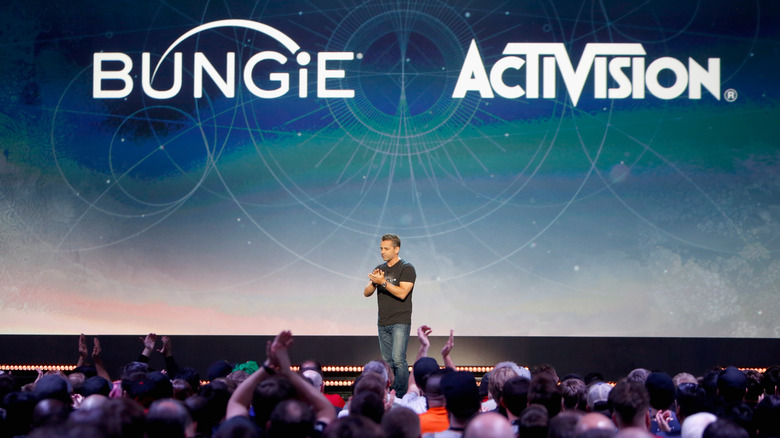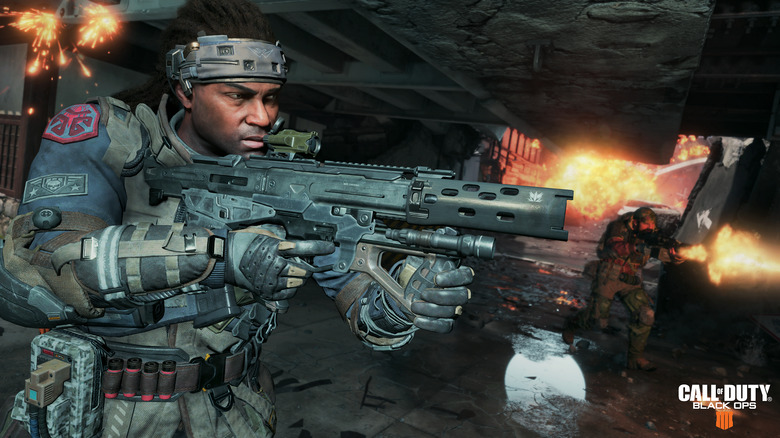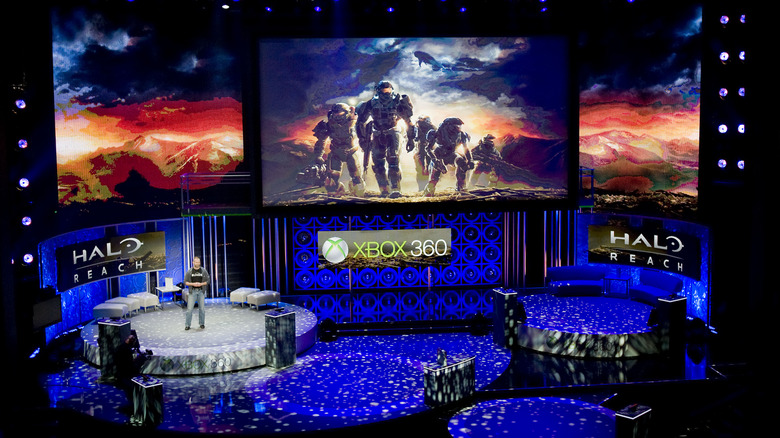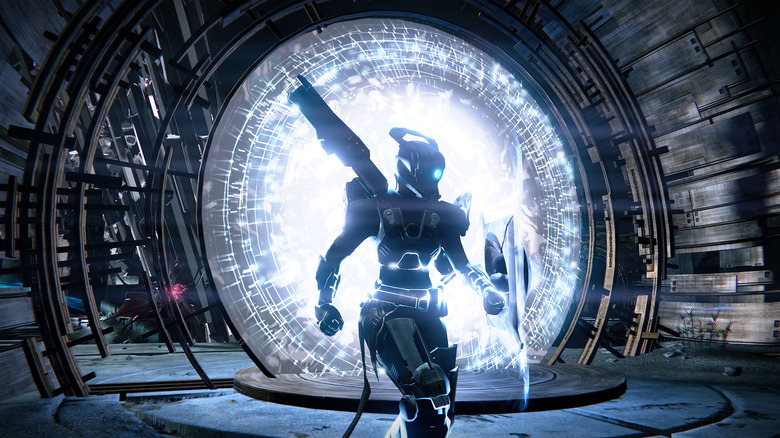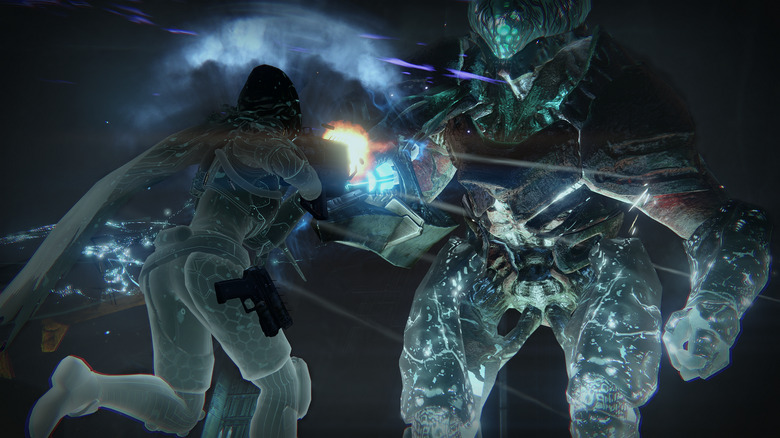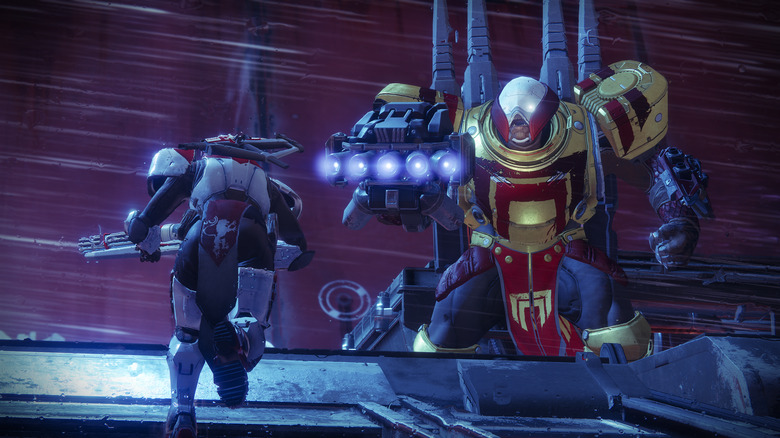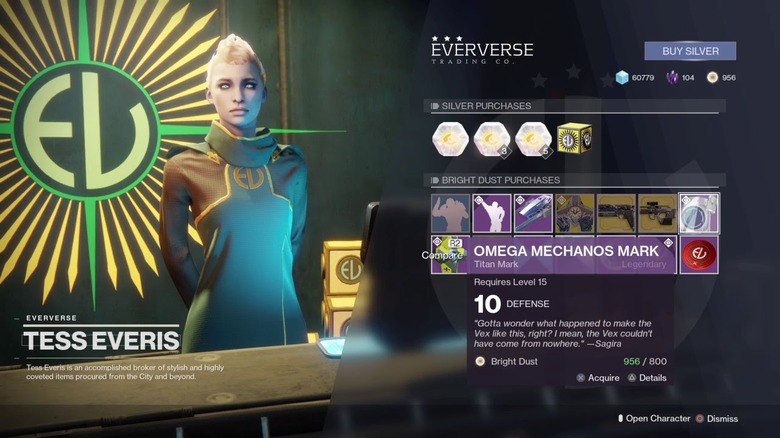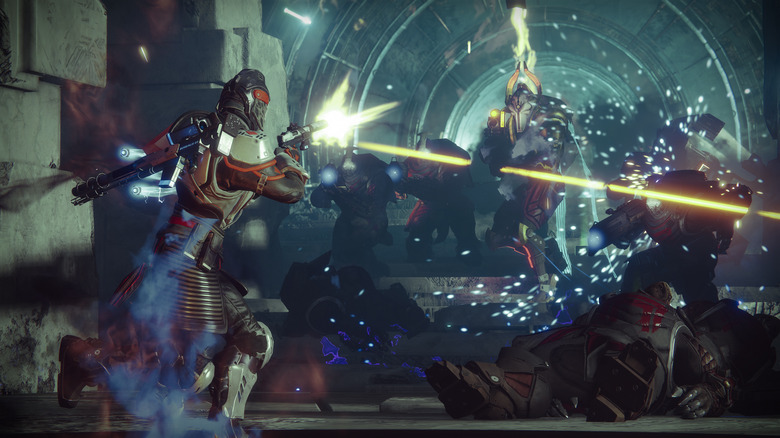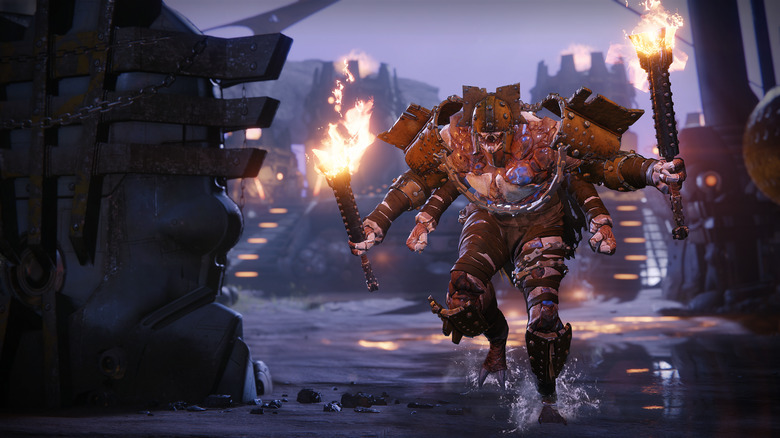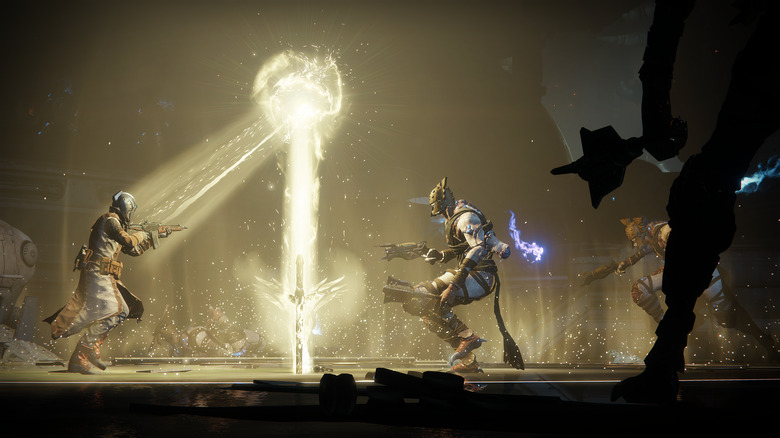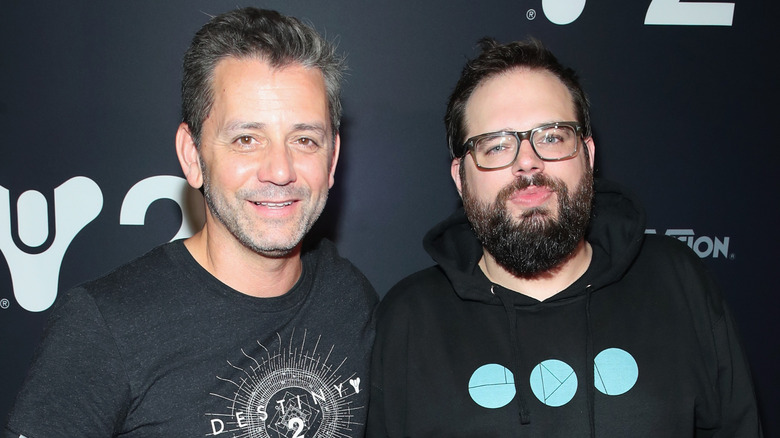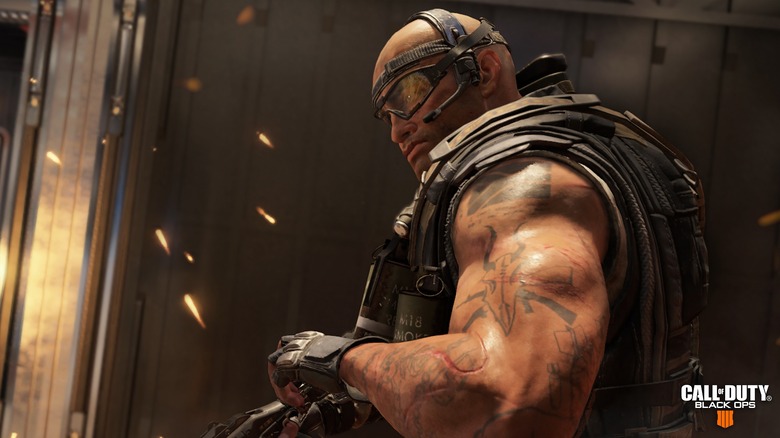The Real Reason Bungie And Activision Split
Nothing sends shockwaves through the gaming industry like a marriage or a divorce. And in the case of Bungie and Activision, it was the latter.
On Jan. 10, 2018, Bungie announced via its blog that the relationship between it and Activision — one that could be traced back eight years — was coming to an end. The statement, of course, came with the expected platitudes. Bungie thanked Activision for its work over those many years. And Activision responded by tweeting some kind words, too, thanking players of the game.
But to say this isn't a split born of turmoil wouldn't be entirely accurate. After all, you don't celebrate with champagne unless you're positively thrilled about something. And in Bungie's case, they seem pretty thrilled about getting away from Activision.
And perhaps the feeling is mutual.
Looking back at the history of Destiny, you can understand why both partners in the deal would've found reasons to be disappointed. The truth is, not everything is meant to be a match. Bungie and Activision have different motivations. They're out to achieve different ends. Over time, problems Bungie had with the Destiny series — as well as problems Bungie had with Activision as a publisher — seem to have played a role in the two calling it quits.
We can't say for certain how the breakup will affect the two companies. But below, we can dive deeper into what likely caused it.
Activision is highly focused on profit
It's tough to argue with Activision's success in the 21st century. The company finds a game formula that works, or a property that fans can't get enough of, and proceeds to milk it for everything it's worth. It's why we get a new Call of Duty game every single year. It's why those same Call of Duty games are almost always hot sellers. And it's why the company is always down to revive a long-forgotten IP and ship a video game using it.
Are those revivals always fantastic games? No. But the way Activision sees it, there's a demand in the market that needs to be met. And if not Activision, then who?
Long story short, Activision likes making money. And, fortunately, Activision is very good at making money. Activision Blizzard CEO Bobby Kotick — who was previously the head of Activision — said in 2010: "We have a real culture of thrift. The goal that I had in bringing a lot of the packaged goods folks into Activision ten years ago was to take all the fun out of making video games."
For better or worse, Activision isn't out to change the world. The company simply wants to make video games that make a lot of money. That philosophy never quite aligned with Bungie's.
Bungie has a bit of an independent streak
Bungie was an independent studio long before coming under the Microsoft umbrella in June 2000. And though the studio published a long string of hit Halo games as a Microsoft subsidiary, those who'd been at Bungie from the beginning — those who longed to work on other things — started to miss that independence. It's why Bungie and Microsoft decided to go their separate ways in 2007, once again establishing Bungie as an independent company. And it's why today, we have the franchise known as Destiny.
But it never quite made sense that Bungie left Microsoft only to immediately sign a huge multi-year publishing deal with Activision.
Most with eyes, ears, and a knowledge of Activision's business model knew that the two companies didn't seem at all compatible. By signing the deal with Activision, Bungie essentially gave itself another large corporation to answer to. And by handing Destiny's publishing rights over to Activision, Bungie left a lot of the decisions in the hands of someone else. Activision handled marketing. Activision struck deals. And Activision set deadlines.
It's likely not what the fiercely independent studio known as Bungie had in mind when it left Microsoft over a decade ago.
The original Destiny stumbled out of the gate
The news that Bungie and Activision were splitting might have come as a surprise for some. After all, it was only in October 2017 that Destiny 2 launched into Activision Blizzard's Battle.net launcher. Bungie even got to make a quick announcement during 2018's BlizzCon, offering to make the base game of Destiny 2 free to PC players for a limited time. But according to Kotaku's Jason Schreier, "Activision and Bungie had a rocky relationship since before Destiny 1 even shipped."
And when you look back, it all starts to make sense.
The original Destiny was delayed, releasing later than it was supposed to in September 2014. And while the game nailed the shooting mechanics — almost a given for a Bungie shooter — there were a lot of problems. The systems were confusing, the grind was unforgiving, and the first two DLCs, while introducing improvements, didn't quite get the job done.
In the first year, Destiny looked a whole lot like what it was: a game that had been delayed, still wasn't totally complete upon its release, and couldn't capture the hearts and minds of the mainstream gamers that Activision makes its money from.
Bungie couldn't create Destiny content fast enough
When Destiny's The Taken King expansion launched in September 2015, it fixed a whole lot of what had plagued the vanilla game. The systems were easier to understand. Progression was more friendly. The game's "King's Fall" raid was outstanding. And the expansion introduced a whole slew of hidden secrets, questlines, and loot. In essence, The Taken King transformed Destiny into what it should have been at the start. And players loved it.
But there was a problem. Bungie simply couldn't keep up with the content demands.
The months following the release of The Taken King were radio silent on Bungie's end. The studio opted not to do another season pass with DLC packs, and eventually, players ran out of things to do. From the time of The Taken King's launch until Spring 2016, Bungie didn't release any new story content. And players, quite understandably, were miffed.
In reality, Bungie never released new content because the studio was hard at work on the Rise of Iron expansion that would arrive later in September 2016, as well as Destiny 2, which eventually launched in September 2017. The drought also had a lot to do with the studio's notoriously slow development tools, which made even small changes an ordeal.
With players again falling out of love with Destiny, Activision again saw a franchise failing to hold up its end of the bargain.
Bungie hit the reboot button for Destiny 2 and made things worse
Destiny 2 was supposed to be a redemption story for Bungie, which had struggled mightily with the first Destiny. The company made significant enhancements in terms of graphics. It placed a major emphasis on creating a more cinematic campaign. Changes were made to the weapons systems. And Bungie kicked things off by announcing two DLC expansions that would arrive in the winter and spring following Destiny 2's launch.
Unfortunately, Bungie removed a lot of what kept hardcore Destiny players engaged.
While the campaign was able to hold its own, the other changes Bungie made to the Destiny formula were not well received. In an effort to make Destiny 2 appeal to more mainstream players, it removed a lot of the game's addictive grind. Leveling up was extremely easy. Exotic weapons, once coveted and extremely rare, were being handed out like candy. And those aforementioned weapons changes? They actually made the game's player-versus-player Crucible more boring than it had ever been.
Bungie simplified Destiny 2 so significantly that it had turned off many of the devoted Destiny fans who'd stuck with the franchise. And because there was nothing there to get the casual players hooked, either, Bungie suddenly had yet another problem on its hands.
Players began to take issue with microtransactions in Destiny
You can point to the delays around the original Destiny as the point where the Bungie/Activision relationship started to go bad. You can also point to the mistakes made with the first and second games along the way. But there's one moment that you can absolutely finger as a fracture point — one where Bungie made a decision players didn't like in order to placate an increasingly frustrated Activision.
That moment is the introduction of Eververse, the microtransactions store that opened its doors in Destiny and showed up day one in Destiny 2.
It's been reported (by who else, Kotaku's Jason Schreier) that the entire reason the Eververse exists is because Bungie was not going to make its Destiny 2 deadline. According to Schreier, Destiny 2 was originally slated for Fall 2016. But Bungie got behind schedule, and the studio got an extra year to work on the full game while releasing the smaller Rise of Iron expansion in Destiny to fill the gap.
Activision was dead set on getting Destiny 2 out the door in 2016. Bungie couldn't do it. So in order to keep Activision's accountants happy, Bungie introduced microtransactions into the mix, hoping to make up for the lost revenue.
To this day, most players would love to see the Eververse go the way of the dodo. Now that Bungie is free of Activision, who knows — maybe it'll happen.
Players were also not happy about the PlayStation exclusivity of some content
When it comes to making deals around video games, you won't find a company more willing to make some extra money than Activision. The company — as other major publishers do — makes a habit of entering into marketing partnerships with platform holders, offering limited-time content and other platform-specific perks in exchange for another bucket of cash. In the past, this has taken the form of gun skins in Call of Duty games, or other content bits that don't wildly change the overall product.
With the Destiny franchise, though, exclusivity took on a whole new meaning.
Ever since the first Destiny arrived in 2014, the PlayStation platform has received long-term exclusivity on major portions of content, including strikes, player armor, and exotic weapons. This irked a lot of players on the Xbox side of things, for good reason. But it actually irritated the PlayStation players, too. Because of the way the Destiny back-end operates, exclusive strikes could never be high-level Nightfall strikes on any platform. And, likewise, exotic weapons could never be sold by in-game vendors on any platform.
The exclusives actually made both Destiny and Destiny 2 worse for everyone involved. And when Destiny 2 launched on PC — and players there discovered that Sony's exclusivity deal still applied — fans really turned sour on the entire idea. And they directed their ire straight at Activision.
Forsaken couldn't bring enough lapsed players back
Destiny 2's Forsaken expansion was legitimately the make-good that long-term Destiny fans had been waiting for. It combined all of the best parts of the original Destiny with the handful of improvements Bungie made with Destiny 2. It came packed with a stellar story campaign. It introduced a ton of new missions, bounties, and world activities. It gave players new and interesting weapons and armor pieces to chase. And it evolved Destiny 2's endgame into something the series had never seen before, adding a whole new location for the raid and its accompanying secrets.
But in a lot of ways, it was too little, too late. Because as good as Forsaken was for Destiny 2, and as much as it pleased those who'd stuck around, much of the Destiny playerbase had simply given up.
You need only look at the two DLC expansions that followed Destiny 2's release to understand why. Curse of Osiris was an abject failure in that it couldn't deliver on story, and didn't fix enough of what the fans didn't like. Warmind, the next expansion that arrived a few months later, did more to address player concerns. But it didn't do enough to inspire hope about the future of the franchise.
In a way, it's bittersweet. Forsaken was a game-changing expansion when it dropped in September 2018. Unfortunately, many had left the game behind. And Activision noticed.
Activision singled Destiny out as an underperforming game
In some ways, you can look back at November 2018 and see the beginning of the end for the Bungie/Activision partnership. At that point, Destiny 2's Forsaken expansion was roughly two months old. It had released to critical acclaim, fixing many of the glaring issues that plagued vanilla Destiny 2. And those who were playing the expansion's content had almost nothing bad to say about it.
Bungie seemed to be operating with a renewed vigor. The studio was thrilled with the way Forsaken had turned out. Activision, however, was not so happy. In an earnings call for its 2018 third quarter, Activision COO Coddy Johnson made a statement that immediately generated headlines: "We have not yet seen the full core reengage in Destiny," Coddy said, "which has led to the underperformance against our expectations to date."
As you might imagine, this immediately raised questions about the future of Destiny. Many players wondered out loud if Bungie could ever salvage the franchise enough for Activision's liking, or if Activision would somehow take control of the Destiny property and send Bungie packing.
Bungie, which had been riding high on Forsaken's critical success, was being called out by its own publisher. That call-out did not go unanswered.
Bungie's Luke Smith fired back at Activision, defending Destiny and Bungie
The Destiny faithful have a sort of love-hate relationship with game director Luke Smith. On one hand, he was responsible for so much of what made the original Destiny great. He had a hand in crafting one of the best raids ever seen in the series, "Vault of Glass." He also took the helm of that game's second-year expansion, The Taken King, and delivered an experience only bested by the more recent Forsaken.
On the other hand, though, he once made a snarky joke about microtransactions that rubbed players the wrong way. And, more significantly, he led the team on the vanilla version of Destiny 2 that fell flat with so many of the franchise's fans.
But when Activision's COO essentially threw both Destiny and Bungie under the bus during its November 2018 earnings call, it was Luke Smith who came to the studio's defense. "We are not disappointed with Forsaken," he tweeted, shortly after news broke of the Activision comments. "We set out to build a game that Destiny players love, and at Bungie, we love it too. Building Destiny for players who love it is and will remain our focus going forward."
Fans of Destiny sent support his way, and toward Bungie as a whole. And for the first time publicly, there was a clear line drawn with parties on each side. Bungie and Destiny fans on one. Activision on the other.
Activision saw a shakeup at the executive level
Is the end of the Bungie/Activision relationship all about differences between the two companies? There's certainly enough evidence above to make that argument. But there's another factor that could've played into the decision to call things off: Activision looks to be moving in an entirely different direction.
There's been some movement at the top of Activision lately. The company recently promoted the Executive Vice President of Call of Duty, making him the president of Activision as a whole. There have been several other high-profile changes as well.
But there's also a bit of news buried in Bungie's statement about the end of the Activision deal: "With our remarkable Destiny community, we are ready to publish on our own," it reads, "while Activision will increase their focus on owned IP projects."
It always felt strange for Destiny to be a part of the Activision Blizzard kingdom, sitting alongside so many other games-as-services while not being owned by Activision Blizzard outright. Perhaps Activision felt that strangeness, as well, and decided it would rather focus on perennial breadwinners like Call of Duty, rather than try to keep tabs on an outside game made by an outside studio.
In any case, it's over.

